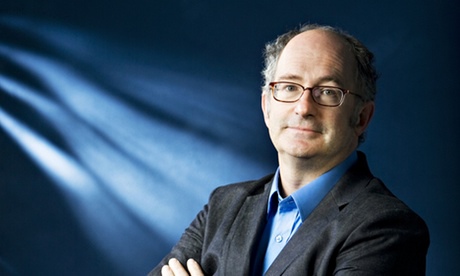
Journalist and author John Lanchester was born in Hamburg in 1962, grew up in Hong Kong and moved to England aged 10. He has written four novels and three non-fiction books, and his work has been translated into more than 20 languages. He was awarded the Whitbread first novel prize for his debut The Debt to Pleasure, and has also received the Hawthornden prize, EM Forster award, and the Julia Child award for literary food writing. He regularly contributes to the New Yorker, Granta and the London Review of Books, where he is a contributing editor. Lanchester's new book, How to Speak Money, is out on 4 September.
Book: A la recherche du temps perdu
This will really annoy everyone, but my touchstone book is Proust. I know people think it's pretentious, long-winded and French, but only one of those things is true. It's very funny, for a start. It mixes crisp aphorisms with a strong sense of the theatrical, so that people are exaggerated, more themselves than themselves – almost like Dickens. I've just started reading it again because Penguin has a translation by Lydia Davis. She famously writes the shortest short stories in the world, and because she's such an unflowery writer, she gets the unnecessary perfume out of Proust's prose. Coming back to it after 20 years, the world looks like a different place, and you get much more out of it.
Album: Bob Dylan – Blood on the Tracks
Like everyone else, I don't listen to records in quite the same way as I used to: streaming services encourage you to hop about more. A couple of months ago I deliberately listened to this, which was my favourite record when I was a kid. It's astonishing how much more you get out of it when you listen to it in a sustained way. When you listen to the whole album, you get this full palette that you don't when a track catches you cold. It's also his 15th studio album and it's his best record. It's really unusual to have your best thing be your 15th of anything. And there's something encouraging about that: how he kept changing, kept going, kept improving.
Museum: The Ashmolean in Oxford
When it was renovated in 2009, I was worried it would become like a departure lounge at Gatwick, in the way those airy, light, modern things can. But although it feels new and modern, it's integrated the old collection beautifully. There's a room in here that has my favourite juxtaposition of paintings in the world: Paolo Uccello's The Hunt in the Forest and Piero di Cosimo's The Forest Fire. The di Cosimo shows animals running away from a fire – there's this hedgehog that has a human face – and at the same time it has all the Renaissance qualities of perspective. Both the pictures are in a world that's emerging into reason and progress, yet have this strong sense of coming out of darkness and delirium.
TV: Game of Thrones
The thing that's really interesting is that it's struck such a chord. I like fantasy, but loads of people don't: it's as if they have an off-switch. They'll go: "Well, but there are elves, and elves don't exist", which seems to be so spectacularly missing the point. When Game of Thrones started being broadcast, I felt like HBO had spent a hundred million quid making something specifically for me. The sense of danger in it is so interesting: it's a depiction of a world that is genuinely dangerous. A lot has been said about the sex and violence on the show, but the violence isn't gratuitous. That's what it's about: a violent, dangerous, dark world where anybody can die at any moment.
Video game: Red Dead Redemption
I've been really interested in video games, because it's the first entirely new potential artform to come along in my lifetime. In games, there's often a tension between the story and the bit everybody loves where you go around blowing stuff up, and they often struggle to reconcile that. But in Red Dead Redemption, the weight of the moral choice becomes part of the game. It makes you identify with the main character, someone with a shady past in the American west who is trying to be good. You can play it trying to be good or you could play it as an outlaw. There's something really interesting about seeing the medium evolve towards empathy and emotional involvement.
The Wind Rises
I don't think I'd know about Studio Ghibli if I didn't have children, but they have an astonishing body of work. Hayao Miyazaki, the director, is the antidote to Disney's thing about people being completely goodies or completely baddies, and knowing what moral the story is going to enforce. In The Wind Rises he's obsessed with planes: they keep recurring as imagery, but the film has a very complex ambivalence towards them. The film talks about an aircraft designer from the 30s: it captures both flight as a means of escape and the poetic ambition of mankind, but also the fact that the planes he designs are also the main warplanes used by the Japanese in the second world war.

